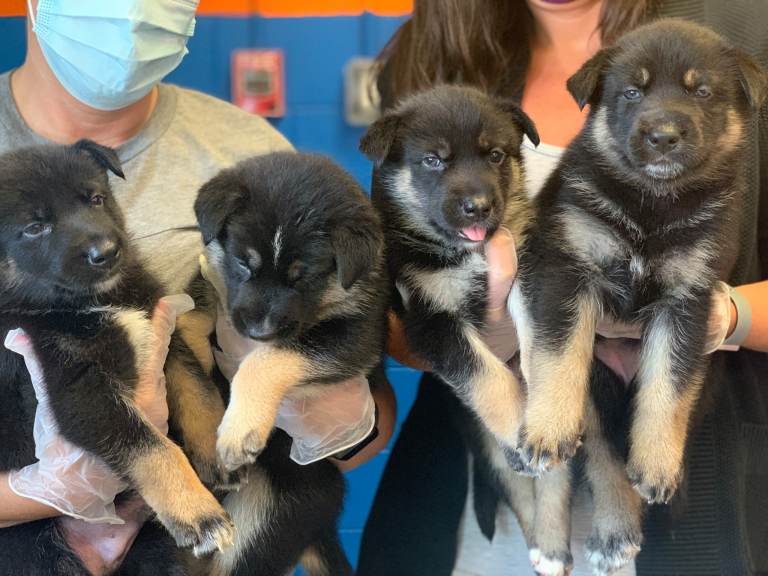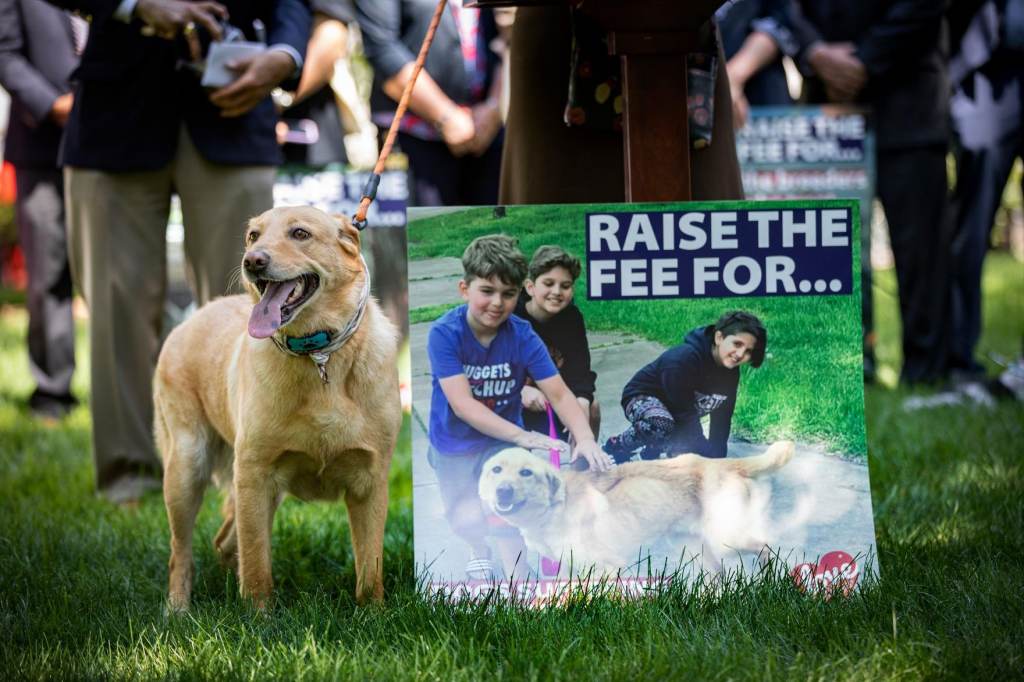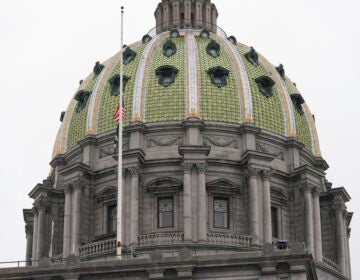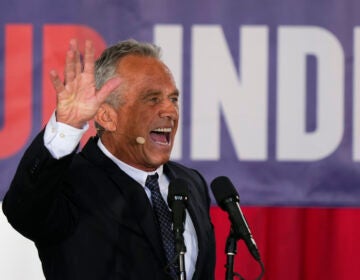Why a funding boost for the office that exposes Pa. puppy mills stalled again
The legislature left for the summer without voting on bills that would raise dog licensing fees, a proposal unpopular among House Republicans, per to a key committee chair.

Puppies are cared for at the Pennsylvania SPCA after being rescued from a property in Berwick. (PSPCA)
This story originally appeared on Spotlight PA.
Partisan divides are stymying legislation to boost funding for the Pennsylvania bureau tasked with exposing puppy mills and handling dangerous dogs, potentially endangering the state’s ability to enforce tougher animal cruelty laws.
The legislature departed for the summer without voting on bills that would have raised dog licensing fees from $6.50 to $10 per year, an increase advocates say is critical to address insufficient staffing and a dire funding shortfall within the state’s Bureau of Dog Law Enforcement.
Without a new and permanent stream of revenue, they say, the bureau will soon be unable to carry out its basic functions.
In an interview this week, state Rep. Dan Moul (R., Adams), who chairs the House committee where one of the bills has languished, said fee increases are politically unpopular. He and other House Republicans fear a public backlash if they were to approve a fee hike — Moul noted that he still receives angry calls from constituents about an unrelated gas tax hike he voted for nearly a decade ago.
“Believe it or not, people will spend thousands of dollars to go buy a dog, but you increase their dog license fees by five bucks, they have a fit,” Moul said.
Instead, Moul said he worked with Agriculture Secretary Russell Redding on an alternate plan that involved tucking the proposed increase in a budget-related bill, as lawmakers might be more likely to approve a major budget package even if it includes a provision they don’t like.
But Moul said Redding was unable to close the deal with the GOP-controlled Senate. The Department of Agriculture did not answer a question about the arrangement, but said in a statement the secretary “met individually with House and Senate members about the need for the dog license fee increase.”
State officials have for years warned the bureau, an often overlooked arm of state government, is running out of money. The bureau is almost entirely funded by licensing fees paid by dog owners, though the price last increased in 1996.
To keep the office afloat, the Department of Agriculture this year is redirecting $1.5 million to the bureau from its own budget. But it’s a temporary fix — and one still underwritten by taxpayers, said Sen. Judy Schwank (D., Berks).
“Taxpayers are paying for this,” said Schwank, one of the sponsors of legislation to raise licensing fees. “Those are tax dollars that fund the overall operations of the Department of Agriculture.”
Even with the $1.5 million from the Department of Agriculture, the bureau is unable to fill job vacancies. Fourteen counties in Pennsylvania are without a dog warden tasked with inspecting kennels, taking in stray dogs, and enforcing all dog-related laws.
“We feel challenged as a department to reconcile the public expectations of the law with the resources in getting that job done because of the absence of fees,” Redding, secretary of the Department of Agriculture, said in an earlier interview.
The Humane Society of the United States publishes a yearly “Horrible Hundred” report featuring a list of dog breeding facilities with poor conditions — commonly known as puppy mills — across the country. According to Kathleen Summers, director of outreach and research at the Humane Society, Pennsylvania usually “factors very significantly on that list,” often with repeat offenders. This year, eight facilities in Pennsylvania are on the list — the fourth highest of all states.
“The fact that the Bureau of Dog Law is going to be less able to to stay on top of those [kennels] is a big concern for us,” Summers said.
Pennsylvania is known among animal rights advocates for having a high volume of puppy mills, earning itself the title of “Puppy Mill Capital of the East.” In an effort to shed that reputation, lawmakers in 2008 passed a package of bills that set the strictest standards in the country for licensed dog kennels, leading to a crackdown on unsafe and unsanitary facilities. Those guidelines increased minimum cage sizes, banned wire flooring, and required veterinary care and exercise for dogs.
The state’s ability to keep enforcing those rules is now in jeopardy.
“My Republican counterparts always say they don’t want to raise taxes,” said Rep. Eddie Day Pashinski (D., Luzerne), who authored one of the bills to increase the fee. “I say for God’s sake, this is an economic solution. This is an appropriate solution which will cost less in the long run.”
Lancaster County is a particular area of concern, according to Summers and Redding. It is one of 14 counties that lacks its own warden but has twice as many licensed kennels than any other county, including three on the “Horrible Hundred” list.
Since several counties lack dog wardens, local law enforcement is often tasked with picking up dog law-related calls.

“[Local law enforcement officials] don’t like it … but at the end of the day if someone’s got a dangerous dog, or if their dog is loose or lost or whatever, they get the calls,” Redding said.
With a standalone fee increase bill too unpopular to advance out of the House Agriculture and Rural Affairs Committee, the earliest the bureau is likely to see a new revenue stream is next summer during the budget process.
But Schwank, Redding, and others hope that when lawmakers reconvene this fall, they’ll take up the issue again with enough members on board to pass the bill. The future of dog well-being in Pennsylvania depends on it, advocates say.
“Democrats and Republicans, and everybody in between, they’re all dog lovers,” Summers said. “[Lawmakers] are not listening to their constituents if they’re not passing budgets that protect dogs because nobody wants Pennsylvania to be seen as a puppy mill state and everybody wants dogs to be protected.”
 Spotlight PA is an independent, non-partisan newsroom powered by The Philadelphia Inquirer in partnership with PennLive/The Patriot-News, TribLIVE/Pittsburgh Tribune-Review, and WITF Public Media.
Spotlight PA is an independent, non-partisan newsroom powered by The Philadelphia Inquirer in partnership with PennLive/The Patriot-News, TribLIVE/Pittsburgh Tribune-Review, and WITF Public Media.
WHYY is your source for fact-based, in-depth journalism and information. As a nonprofit organization, we rely on financial support from readers like you. Please give today.






